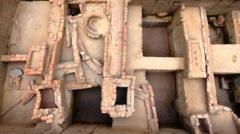Archaeological excavations beneath a soccer field in the Simmering district of Vienna have uncovered a mass grave believed to date back nearly 2,000 years, a time when the Roman Empire was engaged in fierce battles with Germanic tribes. The discovery, made in October by a construction crew, was announced this week by archaeologists working with the Vienna Museum.
Radiocarbon dating of the remains suggests they date back to a time between A.D. 80 and 234, coinciding with the reign of notable Roman emperors, including Trajan and Domitian. Experts surmise that the burial site may point to a disastrous military event where Roman soldiers were potentially defeated, leading to a hasty burial of their dead. Among the artifacts recovered from the grave were weapons such as an iron dagger and lance points, as well as remnants of Roman military gear, indicating the grave’s historical association with combat.
Michaela Binder, the lead anthropologist on the project, emphasized the rarity of unburned Roman remains in Europe, claiming this site offers a unique opportunity to study the lives of individuals during the often tumultuous first century A.D. The discovery of military shoe nails further suggests the identities of the buried individuals, providing insights into the Roman military's operations and social dynamics of that time.
Such discoveries contribute significantly to our understanding of ancient customs and life during the height of the Roman Empire, marking a crucial junction between history and archaeology. The revelation has sparked interest in deeper exploration of the context surrounding these ancient conflicts and the remnants of those who lived through them.




















